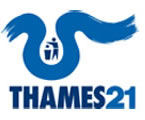'Thames Tunnel Now' Group Criticises Selbourne Report
TTN said there was "no logic" in the suggestion for a shorter tunnel
Environmental, wildlife and amenity groups reacted with dismay to Lord Selborne’s Thames Tunnel Commission report suggesting alternatives to the planned Thames Tunnel. Thames21 Chief Executive Debbie Leach said: “This report’s suggestions will not solve the problem. Should its views be accepted, the River Thames will be devastated by worsening sewage pollution.”
 Debbie Leach continued, “The state of the river is shameful and Thames21 calls for fast, effective action. Caring for the river is a labour of love for thousands of Thames21 volunteers, and the River Thames should be London’s pride and joy. But increasingly frequently people are driven away by disgusting and abhorrent levels of sewage. Research has shown clearly that the Thames Tunnel is the best solution, and we need it delivered without delay.”
Debbie Leach continued, “The state of the river is shameful and Thames21 calls for fast, effective action. Caring for the river is a labour of love for thousands of Thames21 volunteers, and the River Thames should be London’s pride and joy. But increasingly frequently people are driven away by disgusting and abhorrent levels of sewage. Research has shown clearly that the Thames Tunnel is the best solution, and we need it delivered without delay.”
The Thames Tunnel Now group (TTN) said that there was no logic to the Selborne Commission’s suggestion to build a much shorter Tunnel, which does nothing to address 19 of the 34 sewage overflows in London - and is also expected to discharge into the already over-stretched, existing system.
TTN i s an expanding collective of environmental and wildlife charities and amenity groups which came together in October 2011 to protest at potential delays to plans to stop sewage pollution in the River Thames through the construction of the Thames Tunnel project.
Its members include:- Angling Trust, Barge Association, Inland Waterways Association, , London Sustainability Exchange, London Wildlife Trust, Mammal Society, Marine Conservation Society, National Association of Boat Owners, Putney Bridge Canoe Club, River Thames Society, Royal Society for the Protection of Birds, Salmon & Trout Association, Thames21, Thames Anglers Conservancy, Thames Rivers Restoration Trust.
TTN also rejected strongly Lord Selborne’s suggestion that the public should tolerate levels of sewage in the Thames which fail to meet acceptable limits established by the Environment Agency and by experts throughout the world. TTN has issued a stark warning on the dangers to wildlife from lack of oxygen in the water caused by the sewage. Levels of oxygen needed to protect river wildlife were established by the EA following peer reviewed studies of Thames fish including: smelt, sand smelt, salmon, dace, flounder, common goby and bass.
TTN member Putney Bridge Canoe Club pointed out that adoption of lesser solutions such as those suggested by the Selborne Report would mean continuing risk from sewage pollution to the health and well-being of both recreational and commercial users of the river.
The Selborne Commission has proposed that because of the current economic situation the UK should have lower standards of cleanliness. TTN points out that the Thames Tunnel will provide an effective and sustainable solution to sewage pollution for at least one hundred and fifty years. A spokesman said,“Future generations will inherit the decisions we make today. This is a long term strategic decision that is already overdue. To build a shorter tunnel that doesn’t solve the problem simply because of the recession is illogical.”
Data from DEFRA indicates that the economic benefits alone of a cleaner Thames will exceed the costs involved. Chancellor George Osborne has also come to the view that infrastructure projects will help boost the economy.
Chiswick resident Nigel Walley said,“For me, the sewage pollution issue was always slightly abstract and had never considered the very obvious physical impact of sewage overflows. On the day of the clean-up event, we were shocked to be standing up to our ankles in tissue and sanitary waste. I would not have asked the kids to join us for the event had I considered what we were going to encounter.”
Peter Finch, Chairman of the River Society said, “The tidal reaches of the Thames are regularly polluted by the discharge of sewage. In modern Britain this is scandalous and the River Thames Society fully supports the building of a storage tunnel to intercept the overflows. This will benefit all Londoners, as we will have a much cleaner river and a healthier environment.”
However, TTN welcomed the Selborne Report’s emphasis on the value of Sustainable Urban Drainage Systems and green infrastructure. London Wildlife Trust Chief Executive Carlo Laurenzi said, “By implementing such measures widely in new developments and also whenever there is practical opportunity for retrofitting, multiple benefits will be experienced and the Thames Tunnel future-proofed yet further. However, the full tunnel solution is still needed. Half a tunnel, as suggested by Selborne, will just not do the job.”
DEFRA has recently conducted a re-evaluation of the case for the Thames Tunnel, including the economic case for the project, and has re-affirmed its support. The relevant pages on the DEFRA website can be found via this link:
www.defra.gov.uk/publications/2011/11/03/pb13677-thames-tunnel/
November 22, 2011
